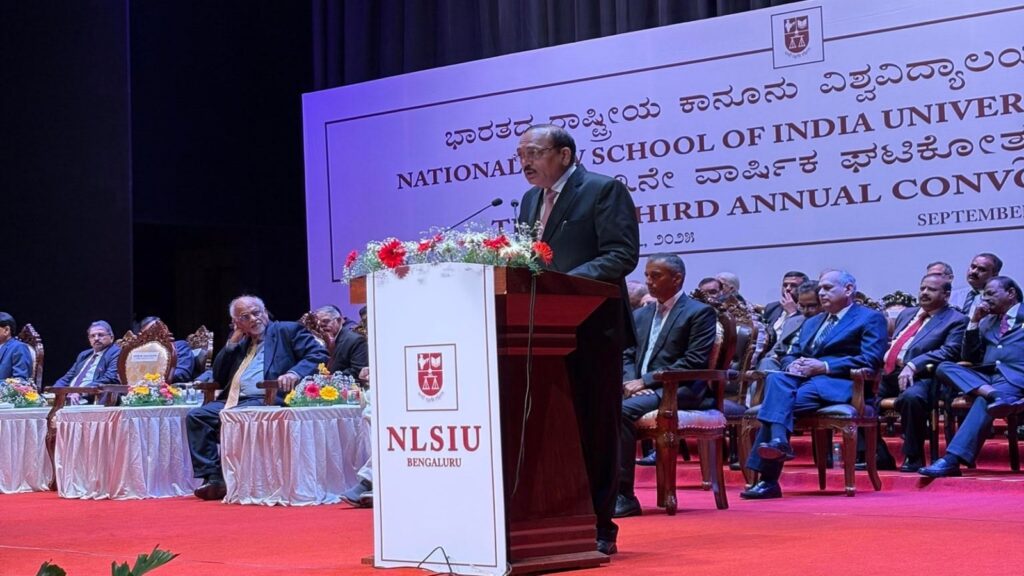Justice Surya Kant of the Supreme Court, in his presidential address to the graduating class of 2025 at Bengaluru’s National Law School of India University (NLSIU) on Sunday, urged new legal professionals to prioritise integrity over advancement and to use law as an “instrument of transformation”.
Speaking during the NLSIU’s 33rd annual convocation, Justice Surya Kant challenged the graduates to embrace their role as agents of social change. Referring to Professor N R Madhava Menon’s original vision for the institution, he noted that the law school was designed to create “social engineers” who would use law not merely as a profession but as a tool for societal transformation.
“Today, as you graduate, the question is not whether you have learnt the law. It is to bend the arc of justice toward the communities that need it most,” he remarked.
Justice Surya Kant outlined three critical junctures that would define the graduates’ careers, warning that these moments “will arrive quietly, almost unremarkably, yet they will define everything that follows”.
“The first will test your ethical boundaries. Will you compromise your values for advancement? The second will challenge your definition of success. Will you choose authenticity or expectations? And the third will question your responsibility to others. Will you lift others as you rise?” Justice Surya Kant said.
Drawing from his own experience, Justice Surya Kant shared how he once challenged a senior advocate’s ethically uncomfortable request early in his career. “When I suggested an alternative approach, he initially resisted but eventually appreciated my candour. That incident taught me something very crucial, that standing by your conscience does not end paths, it only defines them,” he recounted.
Ethical dilemmas
Justice Surya Kant offered practical guidance for navigating ethical dilemmas, citing common scenarios new lawyers might face, such as pressure to overbill clients or prolong disputes for higher fees. “While these actions might be technically permissible, they will never sit well with your conscience,” he cautioned, advising graduates to surround themselves with people whose character they trust and to “write down your own non-negotiables when you are clear-headed”.
Justice Surya Kant addressed the challenge of finding genuine fulfillment in legal practice. “Among accomplished legal professionals, you will find stark contrasts. Some radiate satisfaction despite modest incomes, while others possess wealth and prestige, yet carry a weariness that no external validation can cure,” he said.
He said that discovering one’s definition of success requires deliberate reflection, urging graduates to ask themselves, “Am I pursuing this direction because it excites me or because it impresses others?”
‘Look beyond personal achievement’
Justice Surya Kant said that true leadership in the legal profession requires looking beyond personal achievement. He described reaching a turning point “when you realise you are no longer just benefiting from the profession, you are actively shaping its future”.
“Your legacy won’t be measured by your personal achievements alone. It will be defined by the opportunities you create for those who follow,” he told the graduates.
He challenged them to mentor younger colleagues who need guidance, challenge exclusionary practices when they encounter them, and remove the barriers that they once faced.
“Your chapter in the NLS story begins now. Write it with courage that challenges the impossible. Write it with a purpose that serves something greater than yourself. Write it in a way that inspires the next young person to choose this institution and to believe that NLSIU graduates can indeed be social engineers for justice,” he said.
The convocation ceremony was also attended by several Supreme Court judges including Justice B V Nagarathna and Justice Sanjay Karol, Karnataka High Court Chief Justice Vibhu Bhakru, other senior members of the judiciary, and other legal dignitaries.
52 gold medals
This year, 1,557 students graduated from various academic programmes of NLSIU, including 287 from on-campus courses and 1,270 from off-campus programmes. The graduating batch comprised six Ph D scholars, 26 students from the Master of Public Policy programme, 114 from the Master of Laws programme, 43 from the first graduating batch of the 3-year Bachelor of Laws (Hons) programme, 98 from the 5-year BA LLB (Hons) programme, and 1,270 from the Online and Hybrid Education programmes, which include the Master of Business Laws degree and nine postgraduate diploma programmes.
At the convocation, the university awarded 52 gold medals to 25 graduates, with 36 going to BA LLB (Hons) graduates, two to 3-year LLB (Hons) graduates, 10 to LLM graduates, three to MPP graduates, and one to an MBL graduate from the Online and Hybrid Education programmes. Certificates were also presented to the best-performing students from each of the postgraduate diploma courses.
In addition, the gold medal for the 28th Annual H M Seervai Essay Competition in Constitutional Law was awarded to Niharika Mukherjee, a student of the BA LLB (Hons) programme at NLSIU.

